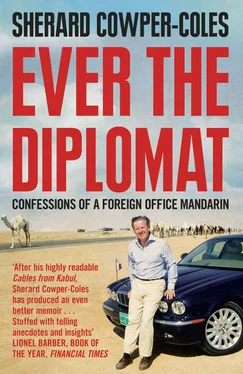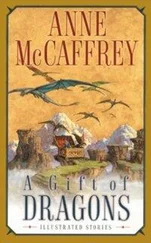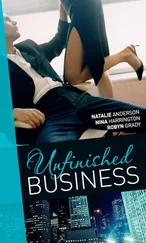I made my first acquaintance with the world of secret intelligence. We received a steady flow of intelligence reports, of varying quality. Some were gold dust, real secrets, but many were little more than gossip, which we would sooner or later have picked up anyway. Others had more comedy than political value. One reported solemnly on a conversation between two IRA men, during which one managed to set himself on fire as they talked. The report’s editor prissily inserted ‘[expletive deleted]’ more than a dozen times, but we could guess what ‘Seamus’ had been saying. Another revealed that a senior Irish diplomat had visited Belfast disguised as a priest, to find out what was happening there.
Like every other British embassy, the Chancery in Dublin kept, and regularly updated, a folder of Leading Personality Reports on key figures in Irish life. Each individual entry was in a set format, with basic biographical information, followed by an account of the subject’s career, and ending with comment and some more personal details. Later much of the juicy stuff was removed, after Mrs Thatcher, as prime minister, complained that Foreign Office LPRs were too gossipy. In 1977, however, it was still possible to record that one senior Irish minister had ‘an unconventional method of mounting a horse’.
Another great advantage of being trained while working on Ireland was that the job involved dealing with much of Whitehall beyond the Foreign Office. The Home Office, for example, was concerned with the operation of the Common Travel Area. The Department of Energy was interested in talking to Ireland about oil and gas in the Irish Sea. The Department of the Environment was anxious to reassure Ireland about discharges from the Sellafield nuclear-waste processing plant in Cumbria. The Ministry of Agriculture had many exchanges on Irish farming issues, both bilaterally and in the context of the European Community. At that time the President of the British Friesian Cattle Society was an Irish priest.
A symptom of the intimate complexity of the relationship was the problem of desertions decades earlier by Irish citizens who had enlisted in the British Army. The Special Branch at Dover would run anti-terrorist checks on lorry drivers passing through the port. Almost every week, or so it seemed, their records would show that twenty or thirty years earlier Sean Higgins (or whoever it was) had deserted from one of the British Army’s Irish regiments. Although an Irish citizen, as a deserter he was subject to British military law, and was immediately transferred to the custody of the Royal Military Police. With his lorry abandoned at Dover, a horrified middle-aged Irishman would then be taken to the depot of his parent regiment, often many miles away, formally to receive a dishonourable discharge. In the meantime, his firm or family would have alerted the Irish Consulate in London, who would ask me to find out what was going on. It was a small but painful hangover from history.
But in 1977 the government departments most concerned with Irish issues were the Northern Ireland Office and, to a lesser extent, the Ministry of Defence. Dealing with these two very different departments was an invaluable experience. The NIO had been formed only in 1972, when the Government in London had imposed direct rule on Northern Ireland. It was composed, in a hurry, of able and dedicated officials from across Whitehall, mainly from the Home Office, but also from the FCO and elsewhere. With bases in London and Belfast, the NIO’s purpose was to work itself out of existence, by restoring devolved government to Ulster. The whole NIO was thus dedicated to the proposition that Northern Ireland needed a political solution, and that a security-only approach would never be enough. The failure of the Sunningdale process had been a huge setback. It had been launched by Ted Heath’s Conservative Government in 1973, but had collapsed thanks largely to the new Labour Government’s unwillingness to face down the Ulster Workers’ Council strike the following year. But even then everyone knew that, as proved to be the case twenty years later, the eventual solution would be on the broad lines of Sunningdale: power-sharing in Northern Ireland, with an ‘Irish dimension’ – that is, recognition that Dublin should have a benign role in overseeing the governance of the six counties of Ulster. As the Social Democratic and Labour Party MP Seamus Mallon was to remark in 1998, the Good Friday Agreement of that year was ‘Sunningdale for slow learners’.
The NIO’s officials – and most of its better ministers – never lost their humane and intelligent vision of how the conflict would, and did, end. And many of them came to love Ulster, and its rich landscapes and cultures. At the same time, they understood that the Nationalist minority’s aspirations had to be accommodated politically in an all-Ireland arrangement which took account of the wish of the Protestant communities – the majority in Northern Ireland, a minority in the whole island of Ireland – to remain part of the United Kingdom.
The Ministry of Defence was rather different. A vast military–civil bureaucratic machine, it had a divided population. On the one hand, enthusiastic officers from all three armed services, socially and intellectually confident but taken temporarily from what they regarded as proper soldiering to ‘drive a desk’ in Whitehall, as a necessary stage of purgatory on the military cursus honorum. On the other hand, career MOD civil servants, generally better educated, at senior levels more intellectually gifted than their colleagues in the uniformed branch, but less well paid and less socially ostentatious. It was, and is, an uneasy union, that works, more or less, provided there is clear direction from the politicians at the top, and from the most senior civil servants who support them.
Working on Ireland also acquainted me with civil servants from shadowier parts of Whitehall: not just the smooth extroverts of MI6 (or Secret Intelligence Service, SIS), many of whom operated under Foreign Office cover, but also the quieter, somewhat more stolid (and probably therefore more reliable) operatives of MI5 (or the Security Service), as well as the frighteningly clever, and often rather geekish, introverts of Government Communications Headquarters (usually known as GCHQ). All three agencies ran courses to present their wares to new entrants to the Diplomatic Service. ‘Six’ came across as a bit too slick. ‘Five’ or ‘Box 500’ (after the PO Box they used) seemed more conservative: every one of our lecturers wore a military tie. They spoke, perfectly sensibly, about the threat from Communist espionage and from Irish terrorism. But there was also some alarmingly right-wing talk of the need to monitor the trade unions and keep an eye on industrial subversion. The ‘West Country’ course – GCHQ is based in Cheltenham – felt a bit like a seminar for prospective mathematics students.
In a separate – but not lower – league were the senior officers of the Metropolitan Police Special Branch. They came across as real Flash Harrys, who dressed and behaved like the stars of some cool television series. They took us, at police expense, to Italian restaurants, and ordered in what was meant to sound like Italian. They were a world away from Whitehall. But they knew what they were doing: the Special Branch had, after all, been created as the Special Irish Branch to deal with the threat of Fenian terrorism in the late nineteenth century.
Back in the Foreign Office, I learned how everything revolved around the Foreign Secretary, known in house as the Secretary of State. In 1977, only nine years after the Foreign and Commonwealth Offices had merged, there was still a rearguard action to remind everyone that the minister in charge was technically the Foreign and Commonwealth Secretary, and to describe him as such. But it was a battle finally lost when Sir Geoffrey Howe, on becoming secretary of state in 1983, said that he wanted to be known simply as the ‘Foreign Secretary’. And there was a definite feeling that working on Commonwealth issues wasn’t serious foreign policy: Trevor Mound had told me that, India apart, it was better to avoid being sent to a Commonwealth post – where our embassies were known as high commissions – if I could.
Читать дальше












